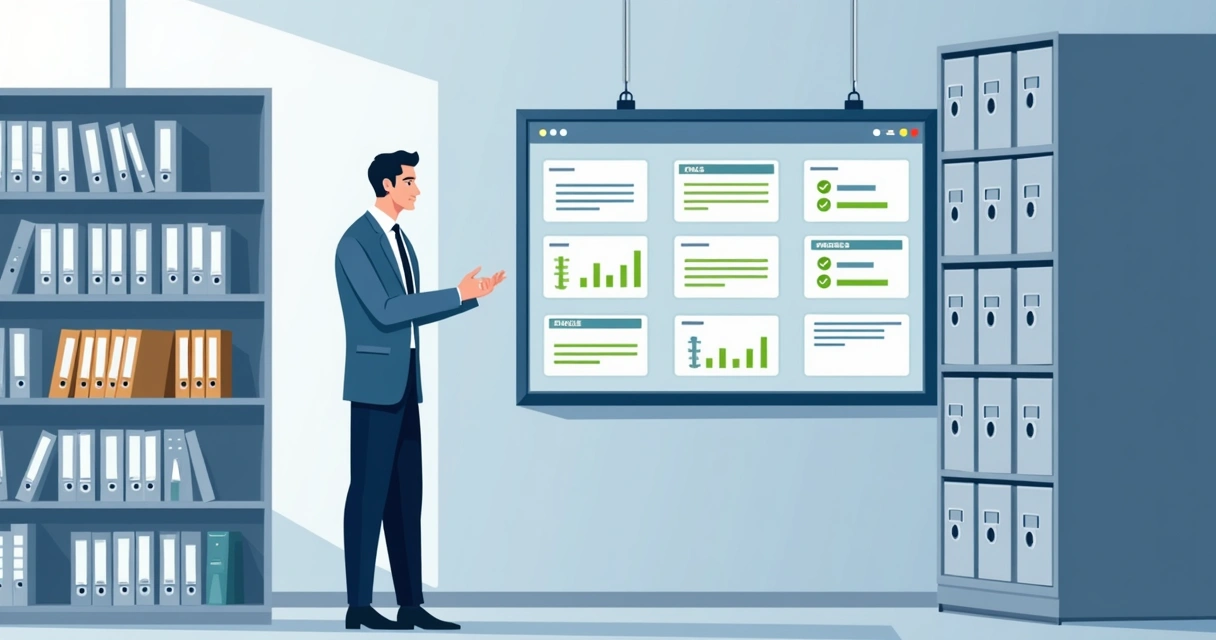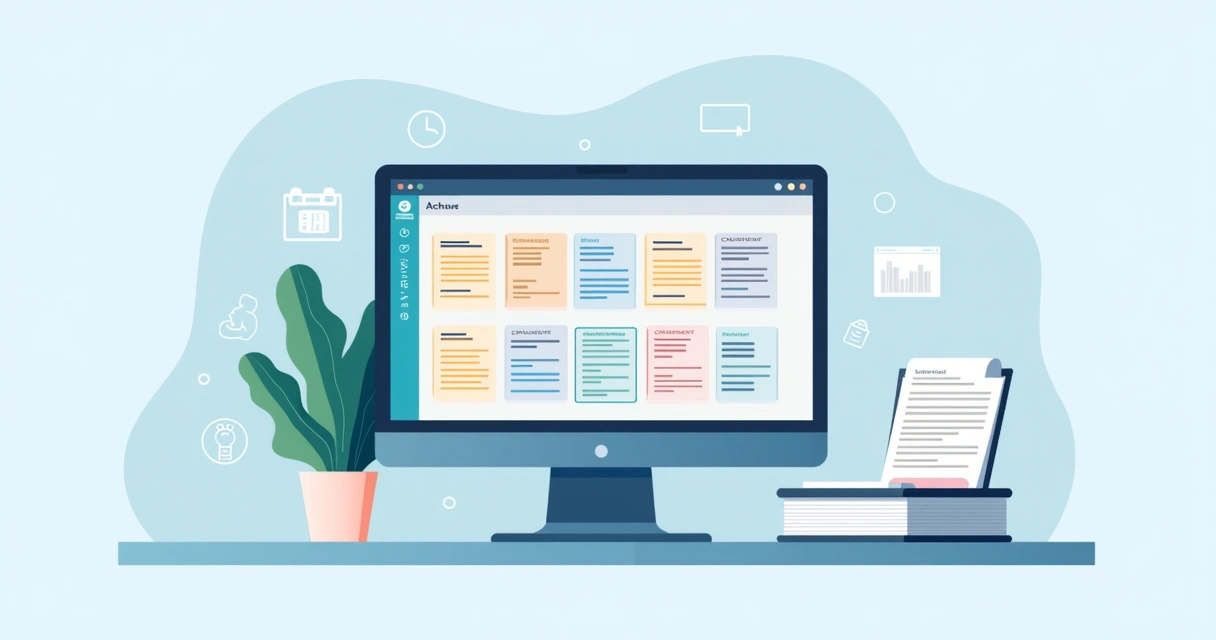There’s a certain thrill in hitting “Done” on a contract or agreement. That moment when the digital ink dries. Job finished, right? Not quite. For most Irish businesses, the journey really starts then, with the long-term archiving of those signed documents, ensuring you can always retrieve them years down the line, maybe when least expected. Let’s talk about how that plays out in real life, with a blend of security, compliance, and ease of access.
Why long-term archiving matters more than you think
You might believe you’ll never need to see that document again. Maybe. But regulations, audits, and those unpredictable client queries make it risky to rely on wishful thinking.
One missed contract can cost years of trust or thousands in disputes.
The Law Society of Ireland highlights how poor data retention, especially for electronic files, can create unexpected legal and operational gaps. Still, many document management systems feel like they were built for 2010, not today, clunky interfaces, weak metadata, overpriced plans. That’s where CloudSign.ie stands apart, blending artificial intelligence, customizable retention settings, and legally robust e-signatures into an experience that doesn’t just meet best practice but goes a step beyond.
Knowing what to save and for how long
The first step in any archiving strategy is identifying what needs saving, and for how long. Some documents, like employment records or contracts, require storage for a decade or more in Ireland. The National Archives of Ireland retention schedule outlines this typically for public bodies, but private companies must often mirror such diligence for tax, compliance, and best practice.
- Contracts and agreements: Minimum 7-10 years
- Financial records: 6 years at least
- Employee agreements: Usually up to 10 years after employee departure
With CloudSign.ie, you’re not wrestling with one-size-fits-all schedules. You set (and adjust) rules per document type or department, no complex IT requests required.

The proven process: from signing to storage
So, you’ve secured signatures on a key contract, now what? Here’s how streamlined digital archiving tends to look at its best.
- Automatic document capture.
As soon as the last signature lands, CloudSign.ie automatically saves both the signed PDF and a detailed signature log. This means instant, tamper-proof records.
- Strong metadata tagging.
Good archiving is all about searchability. By embedding standardized metadata (think: Dublin Core, PREMIS), you ensure quick, pinpoint retrieval. Industry guides like Signdeer’s digital archiving guide stress this, yet we push further: our metadata management is both richer and more user-friendly, connecting vendor, project, expiry dates, and more.
- Encrypted cloud storage.
Not all clouds are created equal. CloudSign.ie hosts archives in EU-based, encrypted environments, impossible for outsiders to decrypt, crucial for Irish compliance and peace of mind.
- Custom retention policies.
You pick how long documents stay (and what happens on expiry). Set department-specific or document-specific rules. And yes, reminders before deletion are just as simple.
- Audit trails and monitoring.
Every access, change, or download is logged, down to the minute. If auditors or clients ever ask how you controlled access, it’s a two-click answer.
Retrieving signed records a decade later… or more
Imagine someone from finance asks you for a contract signed ten years back. Shouldn’t be a nightmare.
With the right metadata and permissions in place, document retrieval is seconds, not hours.On CloudSign.ie, just filter by party name, date, project, or even keyword inside the document itself. Results include the full certified PDF, audit log, and all related attachments.
Frankly, some platforms make this a headache, search fields too limited or PDF viewer lagging. A few competitors, like DocuSign, offer solid tools, but CloudSign.ie’s search, AI insights, and document cross-linking are wider in scope, smoother to use, and designed specifically for Irish business and GDPR expectations.
Security, legal standards, and “future-proofing”
Storing a signed document is one thing. Being able to prove its legitimacy after a decade is something else. Legal requirements in Ireland and the EU have become stricter over the years, especially with electronic signature laws and GDPR (for more, our overview of digital signature validity in Ireland is a must read).
- Long-term integrity: According to the Irish Legal Guide, digital contracts are valid as long as their integrity is intact, no tampering, strong audit trails, and proper validation.
- eIDAS and GDPR compliance: Not all providers tick these boxes. CloudSign.ie has built eIDAS standards into every workflow, and our automatic document classification keeps your data both compliant and organized.
- Data redundancy and backup: We store files across multiple secure data centers, regularly checking for corruption and running backups that can be quickly restored.
Other providers might focus on digital signatures, or legal compliance, or search. CloudSign.ie aims to do them all, without locking key features behind enterprise paywalls or jargon-filled interfaces.

Archiving best practices and real-world reminders
From experience, it’s often the little things that trip people up. Someone leaves a company, folders move, old backup drives break, or policies are forgotten. These simple rules help keep the chaos away:
- Always use standardized file names, making later searching possible (e.g., CLIENT_Project_YYYYMMDD.pdf).
- Embed key metadata on upload, including project, parties, date, and renewal terms.
- Regularly test backups and retrieval, don’t wait for an emergency.
- Review retention policies at least yearly. Rules (and regulations) do change.
- Stay updated on legal shifts, using resources like the beginner’s guide to electronic signatures and the contract lifecycle management software guide.
Oh, and one more: Make things easy for future-you. Always assume someone else (maybe not even at your company) will have to find and understand a file. Simplicity wins.
Why CloudSign.ie is built for long-term archiving
Some digital signature solutions, yes, including a few competitors, might do just enough to squeak by, but if you want peace of mind for the next decade (or two), you need a platform that keeps things simple, safe, and ready for audit at a moment’s notice.
- Custom archiving periods and retention policies that grow with your business.
- Powerful instant retrieval, even with thousands of documents.
- AI-driven risk alerts and contract renewal reminders, so you never wonder if something’s expiring in the background.
- Seamless integrations with Google Drive, Slack, and your CRM, all with full audit trails.
- True “forever free” plan so even individuals can keep their key agreements safe for a decade or more.
You don’t have to take a leap of faith. Try the fastest e-signature and archiving workflow designed for Irish businesses and freelancers.
Your contracts deserve to survive the next ten years. Make it easy on yourself.
Start exploring CloudSign.ie for smarter, safer, longer-lasting digital archives. Your future self will thank you.
Frequently asked questions
How to archive signed documents for decades?
For multi-decade retention, store signed documents in open, non-proprietary formats such as PDF/A, attach rich metadata (for easy searching), and choose an encrypted, EU-based cloud provider that regularly refreshes and audits its archives. Platforms like CloudSign.ie let you set custom retention and run regular checks, so your archives stay safe and accessible.
What format is best for long-term storage?
PDF/A is the safest bet for electronic signature documents. It’s a standardized archival format, ensuring files remain readable even when software and hardware change. Embedding metadata in this format, supported by CloudSign.ie and several international guidelines, keeps information both searchable and secure.
How can I retrieve documents after 10 years?
Retrieval after a decade is straightforward if you’ve set strong metadata and logical naming conventions. With CloudSign.ie, just filter by party, year, keyword, or contract type. The platform’s AI search and clean filters mean you can get a decade-old file in seconds, not hours.
Is digital archiving legally acceptable?
Yes. Digital archives are legally recognized in Ireland and EU law for most business records, especially if their integrity, authenticity, and audit trails are intact. According to the Law Society of Ireland, digital signatures and contract files are accepted barring a few rare exceptions where handwritten ink is required. CloudSign.ie builds in strong audit logs and integrity measures for this purpose.
What backup options are most reliable?
A multi-pronged approach is safest: encrypted cloud storage across multiple physical locations, with regular integrity checks and downloadable offline copies on secure, tested drives. CloudSign.ie stores files at redundant EU centers with regular audits, all while leaving you in control if you want extra copies.
